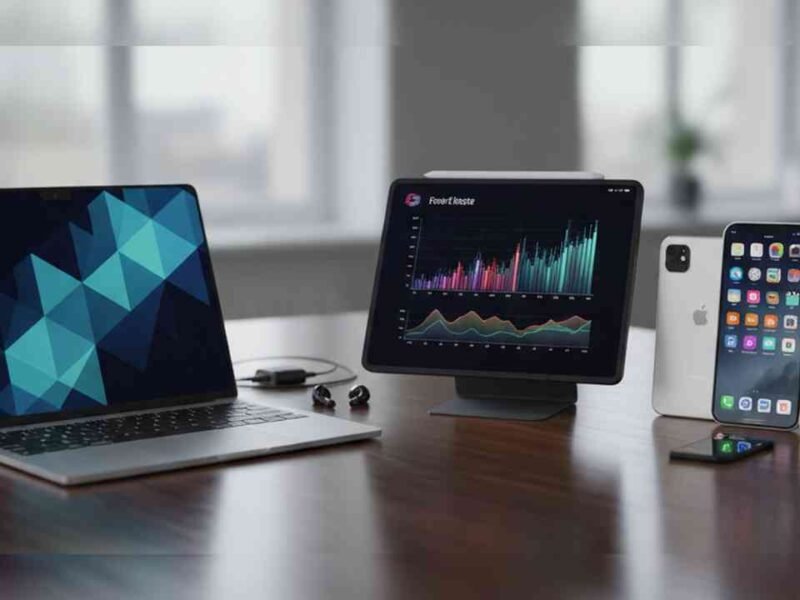The tech world is buzzing with excitement as 2025 ushers in a new era of innovation. From smartphones that redefine performance to tablets that blur the lines between work and play, and laptops that promise unparalleled power, the future is now. But here’s the catch: these groundbreaking devices are launching soon, and missing out could mean falling behind in the digital race. Stay ahead, stay informed, and make sure you’re not left in the dust.
The Smartphone Revolution: What to Expect in 2025
Smartphones in 2025 are not just gadgets; they’re gateways to a new digital experience. The Samsung Galaxy S26 series is set to launch in January 2026, featuring the flagship S26 Ultra and the sleek S26 Edge. These devices promise top-tier performance, advanced camera systems, and AI-driven features that will change the way we interact with our phones. If you’re considering a career in surgical neurophysiology, staying updated with the latest technology is crucial, as these advancements can aid in research and development in the medical field.
Realme is also making waves with its limited-edition Game of Thrones-themed smartphone. Only 5,000 units will be produced, each featuring a heat-sensitive black leather rear panel that turns red when the temperature exceeds 44°C – a nod to House Targaryen’s motto, “Fire and Blood.” This blend of pop culture and technology offers a unique collector’s item for enthusiasts and tech aficionados alike. Such innovations highlight the importance of staying informed about the latest trends, especially for professionals in specialized fields like surgical neurophysiology education, where cutting-edge tools can enhance learning and practice.
Tablets That Blur the Line Between Work and Play
Tablets in 2025 are evolving to meet the demands of both professionals and creatives. The OPPO Pad 5, set to be unveiled on October 16 in China, boasts a 12.1-inch 3K display with a 144Hz refresh rate, HDR support, and Dolby Atmos stereo sound. Powered by the MediaTek Dimensity 9400 Plus processor and a massive 10,300 mAh battery with 67W fast charging, this tablet is designed for seamless multitasking and immersive media consumption. For those in fields like surgical neurophysiology education, such devices can serve as powerful tools for accessing research materials, simulations, and collaborative platforms.
Meanwhile, the OnePlus Pad 3 continues to impress with its Snapdragon 8 Elite performance, 13.2-inch LCD panel, and 16-hour battery life. Its slim and lightweight design makes it a versatile companion for professionals on the go. Whether you’re reviewing medical journals or participating in virtual conferences, this tablet ensures that you stay connected and productive. As the digital landscape evolves, integrating such advanced tools into your workflow can significantly enhance efficiency and learning outcomes in specialized fields.
Laptops That Redefine Power and Portability
2025 is witnessing a surge in laptop innovations that cater to a wide range of needs. The Razer Blade 16, introduced at CES 2025, is the first in its series to feature an AMD processor and the top-tier NVIDIA RTX 5090 GPU, all within a 30% smaller frame than its predecessor. This compact powerhouse is perfect for gamers and professionals who require high performance without compromising on portability. For those in specialized fields like surgical neurophysiology education, such laptops can handle complex simulations and data analysis with ease.
Lenovo’s ThinkBook Plus Gen 6 offers a unique flexible display that extends from 14 inches to 16.7 inches, providing ample screen real estate for multitasking and creative projects. Its innovative design caters to users who value versatility and functionality. Additionally, Acer’s Aspire Vero 16 emphasizes sustainability without sacrificing performance, featuring a chassis made from over 70% recycled plastic and bio-organic materials. These developments underscore the importance of staying abreast of technological advancements, as they can offer new tools and methodologies for professionals in various fields, including surgical neurophysiology education.
AI and the Future of Computing
Artificial Intelligence is no longer a futuristic concept; it’s here, and it’s transforming the way we interact with technology. Intel’s upcoming Panther Lake chip, set to debut in late 2025, introduces the new Cougar Cove P-cores and Darkmont E-cores, delivering significant efficiency and performance gains. With support for AI enhancements and up to 128GB memory, this chip is poised to revolutionize computing. For professionals in specialized fields like surgical neurophysiology education, AI can facilitate advanced simulations, data analysis, and personalized learning experiences, making it essential to stay informed about these developments.
As AI continues to evolve, its applications in various sectors expand. From automating routine tasks to providing insights through data analysis, AI is becoming an indispensable tool. For those in education and research, leveraging AI can enhance the learning process, offering personalized content and interactive simulations that cater to individual needs. Embracing these technologies can lead to more effective and engaging educational experiences, particularly in specialized disciplines.
Smartphones as Tools for Professional Growth
In 2025, smartphones are more than just communication devices; they’re powerful tools for professional development. With advanced processors, high-resolution displays, and AI capabilities, these devices enable professionals to access resources, collaborate with peers, and stay updated with the latest research. For individuals pursuing careers in fields like surgical neurophysiology, smartphones can serve as portable platforms for learning, networking, and professional growth. Staying connected and informed is crucial in today’s fast-paced world, and having the right tools can make all the difference.
Moreover, the integration of specialized applications and platforms tailored for specific professions enhances the utility of smartphones. For instance, medical professionals can access patient data, research articles, and simulation tools directly from their devices, facilitating continuous learning and informed decision-making. As technology continues to advance, the role of smartphones in professional development will only become more significant, making it essential to choose devices that align with one’s career goals and needs.
Tablets as Educational Powerhouses
Tablets in 2025 are designed to cater to the diverse needs of students and professionals alike. With powerful processors, high-resolution displays, and long battery life, these devices are ideal for accessing educational content, participating in virtual classes, and conducting research. For those in specialized fields like surgical neurophysiology education, tablets can serve as interactive platforms for learning, offering access to simulations, anatomical models, and collaborative tools. The portability and versatility of tablets make them indispensable tools for modern education.
Furthermore, the availability of specialized applications and resources tailored for specific disciplines enhances the learning experience. Medical students and professionals can utilize anatomy apps, medical journals, and virtual labs directly from their tablets, facilitating immersive and hands-on learning. As the landscape of education continues to evolve, integrating such technologies can lead to more effective and engaging learning experiences, particularly in specialized fields that require detailed and interactive content.
Laptops for the Modern Professional
Laptops in 2025 are built to meet the demands of the modern professional. Whether you’re a creative, a gamer, or a researcher, there’s a laptop designed to cater to your specific needs. With powerful processors, high-resolution displays, and long battery life, these devices enable professionals to work efficiently and effectively from anywhere. For individuals in specialized fields like surgical neurophysiology education, laptops can serve as portable workstations for research, simulations, and collaboration. Choosing the right laptop can enhance productivity and facilitate professional growth.
Additionally, the integration of specialized software and tools tailored for specific professions further enhances the utility of laptops. Medical professionals can access research databases, simulation programs, and patient management systems directly from their laptops, streamlining workflows and improving efficiency. As technology continues to advance, the role of laptops in professional development becomes increasingly important, making it essential to select devices that align with one’s career goals and requirements.
Why You Can’t Afford to Wait
The technological landscape is evolving rapidly, and staying ahead of the curve is crucial. Delaying the purchase of these upcoming devices means missing out on the latest features, performance enhancements, and innovations that can significantly impact your professional and personal life. Whether you’re in education, research, or any other field, having access to the latest technology can provide a competitive edge, streamline workflows, and enhance learning experiences. Don’t let the opportunity pass by – invest in the future today and equip yourself with the tools that will shape tomorrow.
Remember, the devices launching in 2025 are not just upgrades; they’re game-changers. From smartphones that redefine communication to tablets that revolutionize education and laptops that empower professionals, these innovations are designed to meet the demands of the modern world. Embrace the future, stay informed, and make sure you’re not left behind in the digital age.


